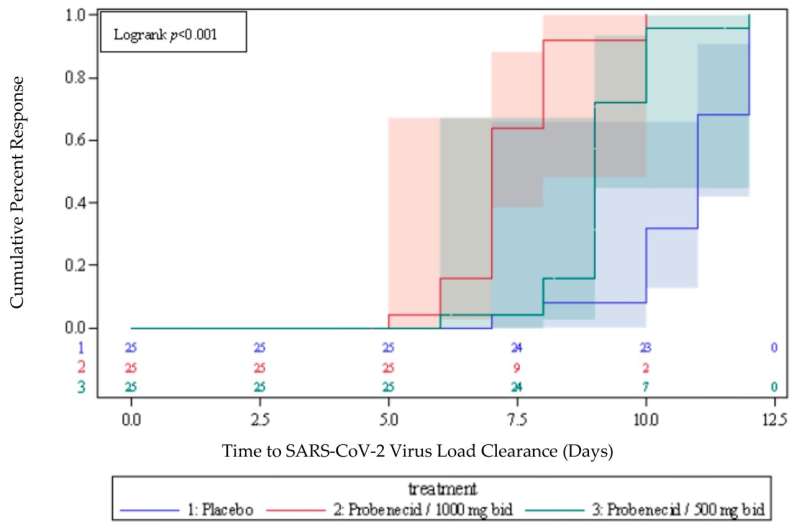This article has been reviewed according to Science X's editorial process and policies. Editors have highlighted the following attributes while ensuring the content's credibility:
fact-checked
trusted source
proofread
Commonly used gout drug found effective against COVID-19

An anti-inflammatory drug commonly used to treat gout could significantly improve outcomes in patients with mild-to-moderate COVID-19 infections, according to research by a team led by University of Georgia professor Ralph Tripp.
In a dose-range study of probenecid, a drug originally approved in 1951 to prevent the production of gout-causing uric acid, researchers showed significant improvements both in preventing the transmission of COVID-19 and the speed at which symptoms cleared in patients. In comparison to other FDA-approved drugs used to treat the virus, probenecid helped clear symptoms several days faster, Tripp said.
"This is a significant development," said Tripp, a professor in the College of Veterinary Medicine and a Georgia Research Alliance Eminent Scholar. "It shows improvement in both virus clearance and symptom reduction."
TrippBio, the biotechnology company co-founded by Tripp and colleagues, enrolled 75 non-hospitalized patients with mild-to-moderate COVID-19. The patients were divided into three groups: one receiving 500 milligrams of probenecid twice daily, another receiving 1,000 mg twice daily and a third receiving a placebo twice daily for five days. Symptoms were recorded incrementally over the course of 28 days to assess progress.
None of the 75 patients who completed the study were hospitalized, and the group receiving the twice-daily 500 mg treatment showed a two-day improvement (nine days compared to 11) in viral clearance over the placebo. Importantly, the 1,000 mg treatment doubled the clearance improvement to four days, resulting in an average recovery time of seven days. Patients treated with probenecid also showed improvements within three to five days after contracting the virus.
The most effective treatment, Tripp said, is for patients to take 1,000 mg tablets twice daily for approximately five days.
The study included patients aged 18-65 who experienced mild to moderate symptoms. Tripp classified "mild" as a patient who has tested positive for the infection using a PCR test and exhibited symptoms such as elevated body temperature, reduced oxygen saturation, decreased respiratory rate and other conditions outlined by the World Health Organization. The study demonstrated improvements in each of these areas.
Long used as a treatment for gout, probenecid has sparked interest in its potential to treat respiratory illnesses in both children and elderly patients. Development of oral tablets and syrup forms of the drug is being considered, and further testing is needed to determine whether a higher dosage or improved solubility could enhance results.
Tripp also suggested testing was needed to confirm the effectiveness of the drug against other respiratory viruses. The drug has shown strong activity against both influenza and respiratory syncytial virus (RSV) in laboratory and animal studies.
TrippBio, a company based on decades of research by Tripp, identifies new applications for existing drugs. The UGA Research Foundation is a major shareholder of the company.
The paper is published in the journal Viruses.
More information: David E. Martin et al, Oral Probenecid for Nonhospitalized Adults with Symptomatic Mild-to-Moderate COVID-19, Viruses (2023). DOI: 10.3390/v15071508



















